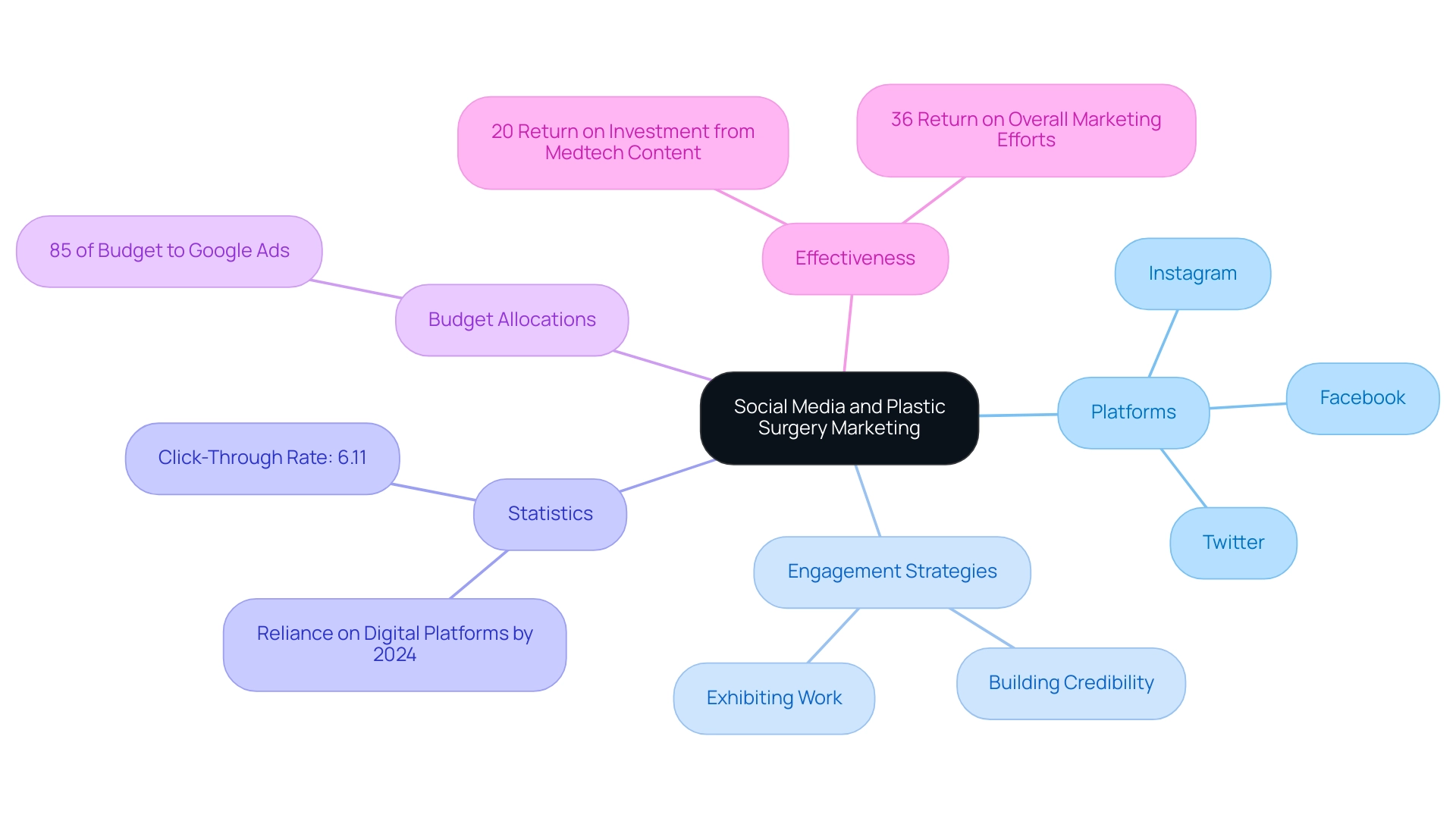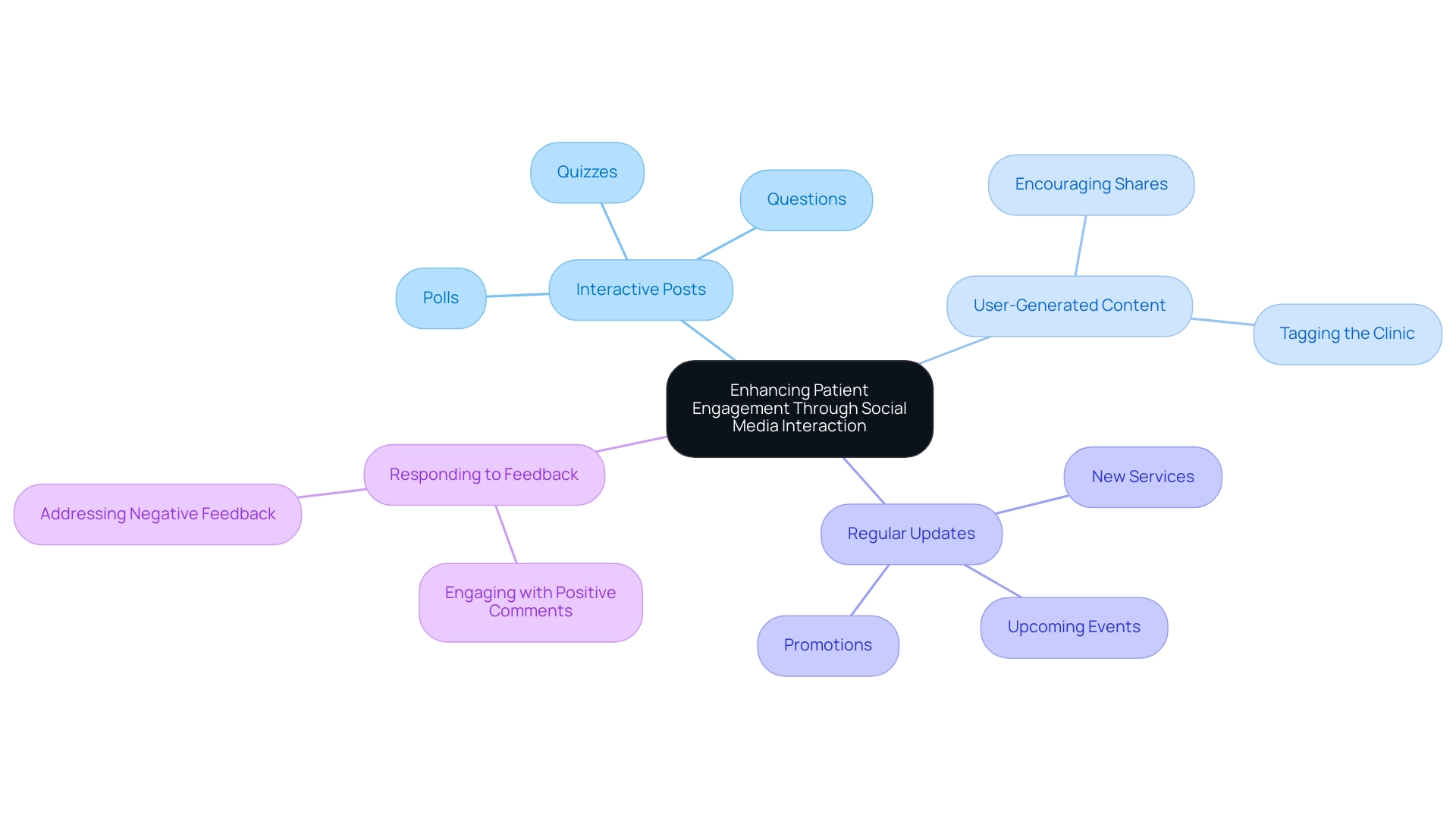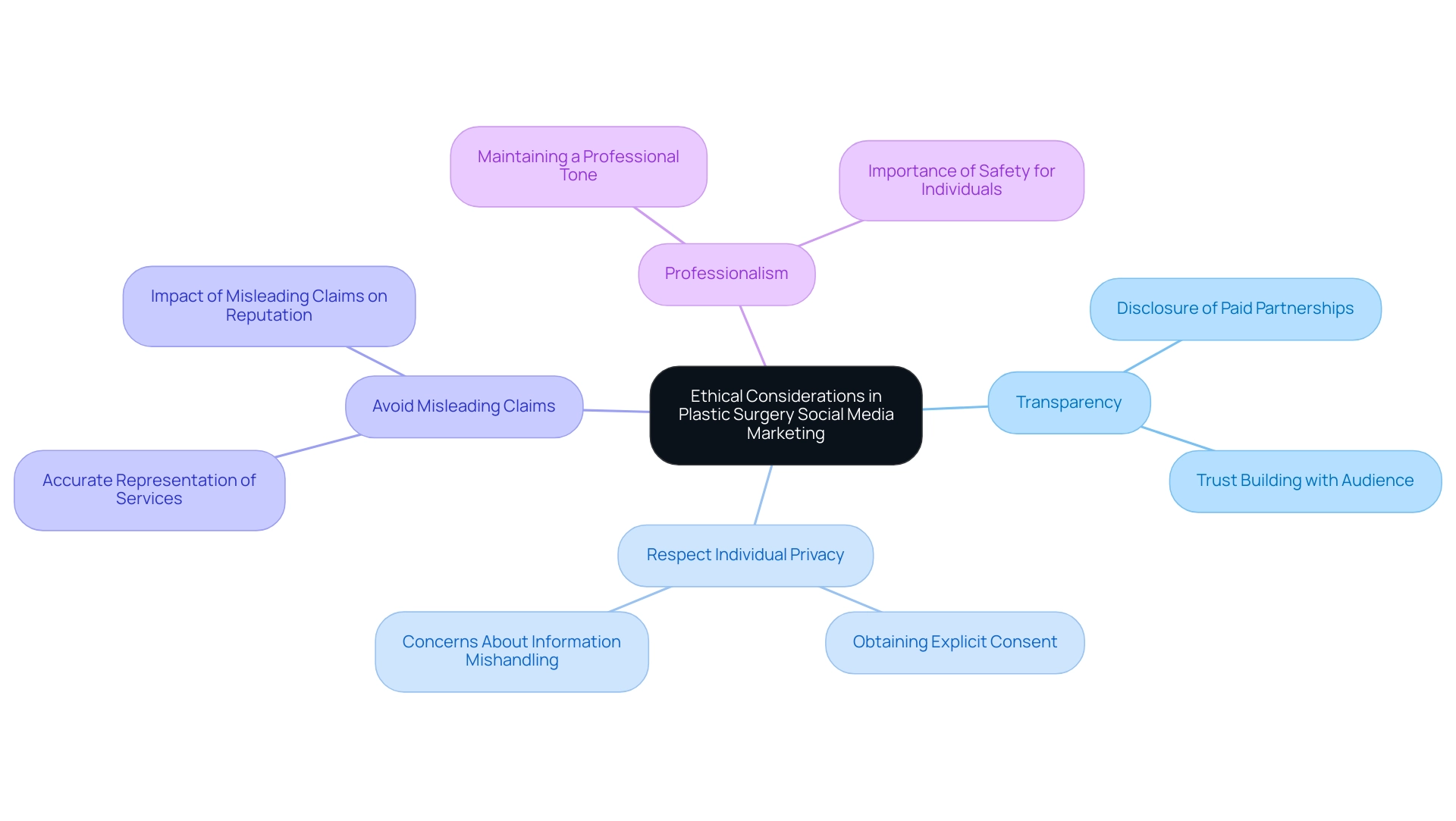Introduction
In the evolving landscape of healthcare marketing, social media has emerged as a vital tool for plastic surgeons aiming to connect with potential patients. With platforms such as Instagram and Facebook offering unique opportunities to showcase transformative results and foster direct engagement, the influence of social media on patient decision-making is undeniable.
As trends indicate a growing reliance on these digital channels for information about cosmetic procedures, it becomes imperative for clinics to establish a robust online presence. This article delves into the critical strategies for leveraging social media effectively, enhancing patient engagement, and navigating the ethical considerations inherent in this dynamic marketing environment.
By understanding and implementing these techniques, plastic surgery practices can not only increase visibility but also cultivate trust and authenticity with their audience.
The Synergy Between Social Media and Plastic Surgery Marketing
In today’s healthcare environment, marketing strategies for plastic surgeons increasingly rely on plastic surgery social media marketing as an indispensable element. Platforms like Instagram, Facebook, and Twitter enable practitioners to engage directly with potential clients, exhibit their work through compelling visual content, and build credibility within the community. The inherently visual nature of these platforms is particularly beneficial for showcasing before-and-after transformations, allowing potential clients to assess the results of various procedures effectively.
As healthcare promotion continues to evolve, recent statistics indicate that by 2024, a significant portion of patients will depend on digital platforms to inform their decisions regarding cosmetic procedures, underscoring the necessity for clinics to cultivate a strong online presence. Moreover, incorporating online platforms within a wider promotional strategy not only enhances visibility but also fosters trust through authentic interaction with the audience. Importantly, automation in healthcare promotion can greatly decrease administrative expenses, totaling $122 billion, which demonstrates the effectiveness that online strategies can bring.
However, despite a meager 6.11% click-through rate, hospitals allocate a staggering 85% of their budget to Google Ads, highlighting the contrast between traditional and digital advertising methods. Successful plastic surgery clinics that have leveraged the power of plastic surgery social media marketing exemplify this trend, demonstrating that genuine engagement can significantly influence patient decisions in cosmetic enhancement. Furthermore, a case study showed that half of the surveyed individuals in the US indicated that medtech content promotion yielded at least a 20% return on investment, compared to only 36% for overall promotional efforts, further demonstrating the effectiveness of digital strategies, including online platforms, in achieving measurable outcomes.

Proven Strategies for Effective Plastic Surgery Social Media Marketing
To enhance plastic surgery social media marketing efforts, plastic surgeons should adopt the following strategies:
- Targeted Advertising: Leverage the advanced targeting features on platforms like Facebook and Instagram to effectively reach specific demographics, including age, gender, and geographic location. Given that 68% of consumers reported that social media accounts influenced their decisions, utilizing plastic surgery social media marketing can significantly enhance engagement.
Notably, for individuals aged 70 and older, Facebook is preferred, making it essential to tailor content for this demographic, such as sharing before and after photographs for blepharoplasty.
-
Regular Posting Schedule: Consistency is essential; establishing a content calendar will ensure a steady stream of informative and engaging posts that resonate with followers.
-
Collaborations and Influencers: Engage with local influencers who align with your practice’s ethos to broaden your reach and enhance credibility within the community. This aligns with the 2024 strategy of leveraging influencers for plastic surgery social media marketing to maximize exposure.
-
Video Content: Focus on creating engaging video material for plastic surgery social media marketing to showcase procedures, testimonials, and educational resources, as video is increasingly becoming a dominant format in this field.
-
Client Testimonials: Highlight genuine testimonials and success stories from pleased clients, which can foster trust and demonstrate the quality of outcomes your practice delivers.
-
Engage with Followers: Actively responding to comments and messages not only builds a sense of community but also encourages ongoing interaction, further solidifying relationships.
Furthermore, practices should contemplate integrating email promotion strategies to sustain client loyalty and draw in new prospects, as effective email techniques can aid in client retention and expansion. Emphasizing these strategies is crucial as the demand for cosmetic procedures continues to grow, with 12% of consumers motivated by the desire to alter their appearance.

Creating Engaging Content for Social Media Platforms
In the highly competitive landscape of plastic surgery social media marketing, it is paramount to create engaging content. To effectively capture the attention of prospective clients, consider the following content types:
-
Visual Content: High-quality images and videos are indispensable for showcasing before-and-after transformations.
Additionally, using infographics to explain procedures can enhance understanding and engagement. Statistics indicate that the keyword ‘oral maxillofacial surgeon near me‘ has approximately 90,500 Google searches in the US, highlighting the significance of digital visibility in drawing potential clients. -
Educational Posts: Offering informative content about various procedures, expected recovery times, and essential safety tips not only educates potential clients but also establishes your authority as an expert in the field.
-
Live Q&A Sessions: Hosting live sessions on social media platforms allows followers to ask questions directly about procedures.
This fosters engagement and provides an opportunity to address concerns in real-time, creating a more interactive experience. -
Behind-the-Scenes Content: Sharing insights into your clinic’s environment, introducing staff members, and showcasing everyday operations can humanize your brand.
This approach helps establish rapport with prospective clients by making your practice more relatable.
Notably, research from Sorice et al. indicates that Facebook has the highest user engagement, followed by Instagram, highlighting the importance of selecting the appropriate platforms for content distribution.
Furthermore, the case study titled ‘Social Media and the Plastic Surgery Individual’ provides real-world evidence of engagement across these platforms, reinforcing the effectiveness of these content strategies.
By prioritizing these content strategies, plastic surgery practices can effectively enhance their online presence and engage with their audience meaningfully through plastic surgery social media marketing.

Enhancing Patient Engagement Through Social Media Interaction
To enhance user engagement on social media effectively, consider implementing the following techniques in plastic surgery social media marketing:
-
Interactive Posts: Develop polls, quizzes, and questions that invite followers to participate actively and share their insights. This not only enhances interaction but also offers valuable feedback on individual preferences.
-
User-Generated Content: Actively encourage pleased individuals to share their experiences and tag your clinic. This strategy not only fosters a sense of community but also acts as authentic testimonials that can significantly impact potential clients’ choices in plastic surgery social media marketing.
According to recent findings, 1 out of 2 surveyed in the US noted that medtech content marketing offered at least a 20% return on investment, underscoring the effectiveness of strategies like user-generated content.
-
Regular Updates: Maintain transparency by providing your audience with consistent updates regarding new services, promotions, and upcoming events. This keeps your clinic prominent and shows your dedication to client engagement.
-
Responding to Feedback: Engage actively with comments, whether they are positive or negative. Addressing inquiries and concerns illustrates that you value their input and are dedicated to improving their experiences.
In a landscape where 80% of patients prefer digital communication with healthcare providers, plastic surgery social media marketing techniques are essential for fostering strong relationships and enhancing overall patient satisfaction. As John Doe noted, ‘Over 40% of marketers see AI as a potential job threat, but here’s the good news: a whopping 97% believe it will enhance their careers!’
This highlights the evolving landscape of digital promotion in healthcare, making plastic surgery social media marketing crucial for clinics to adapt and engage effectively.

Ethical Considerations in Plastic Surgery Social Media Marketing
Participating in plastic surgery social media marketing requires strict compliance with ethical principles that regulate healthcare communication. Key practices include:
- Transparency: It is imperative to clearly disclose any paid partnerships or sponsorships to foster trust with your audience.
This corresponds with the increasing demand among individuals for transparency in promotion, as emphasized by the National Council of State Boards of Nursing (NCSBN), which highlights the significance of ethical standards in social media usage. According to the NCSBN’s White Paper, a significant number of individuals believe that transparency in marketing is crucial for their trust.
-
Respect Individual Privacy: Before sharing images or testimonials, obtaining explicit consent is essential to ensure compliance with privacy regulations. Privacy concerns regarding individuals have become increasingly prominent, with studies indicating that a significant portion of them worry about their information being mishandled on social media.
-
Avoid Misleading Claims: All promotional materials must accurately represent the services offered and the anticipated outcomes. Misleading claims can lead to dissatisfaction among clients and ethical breaches, which can damage a practice’s reputation.
-
Professionalism: Maintaining a professional tone in all communications and marketing materials is crucial. This approach reflects the seriousness of the services provided and underscores the importance of safety for individuals. The ethical considerations surrounding plastic surgery social media marketing in healthcare, as explored in the case study titled “Ethical Issues of Social Media Usage in Healthcare,” highlight the necessity for clear guidelines to navigate these complexities effectively.
Dr. Timothy Deer emphasizes this point, stating that ethical practices in marketing are essential for maintaining patient trust and safety.

Conclusion
Social media has become an essential component of plastic surgery marketing, providing a powerful platform for clinics to connect with potential patients. By leveraging visual content, targeted advertising, and interactive engagement strategies, practices can effectively showcase their expertise and foster trust within their communities. As the data indicates, a significant number of patients now rely on social media when making decisions about cosmetic procedures, making it crucial for clinics to establish a robust online presence.
Implementing proven strategies such as:
- Collaborating with influencers
- Maintaining a consistent posting schedule
- Utilizing engaging content types
can significantly enhance patient engagement. The emphasis on transparency and ethical considerations cannot be overlooked; clinics must prioritize patient privacy and avoid misleading claims to uphold their reputation and maintain trust.
In conclusion, as the landscape of healthcare marketing continues to evolve, the integration of social media into plastic surgery practices is not merely advantageous but essential. By adopting these strategies and adhering to ethical guidelines, plastic surgeons can navigate this dynamic environment effectively, ultimately leading to increased visibility, patient engagement, and successful outcomes.

